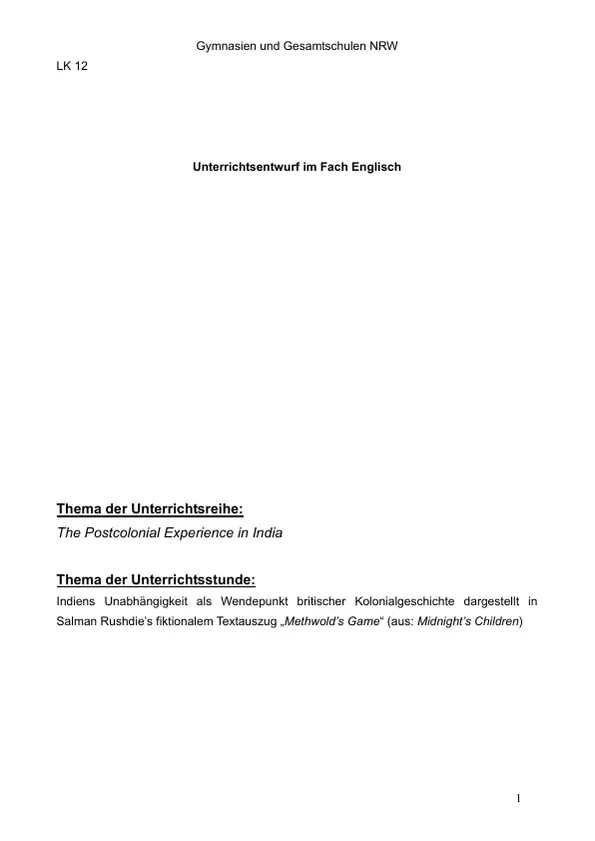Die Schüler und Schülerinnen sollen den Text multiperspektivisch in kooperativer Gruppenarbeit bearbeiten können, indem sie aufgabenorientiert auf Vorwissen zurückgreifen, um den ausgewählten literarischen Text der Textsorte angemessen zu analysieren und im historischen Kontext mit seiner Gegenwartsbedeutung darzustellen.
Inhaltsverzeichnis
- 1.1 Geplanter Verlauf der Unterrichtsreihe
- Lead-In
- H. Kureishi's fiktionaler Textauszug “Clash of Cultures”
- The Commonwealth of Nations
- Webquest Postcolonialism in India
- Die Bedeutung von Indien's Unabhängigkeit
- India - The Postcolonial Experience – Teampräsentationen (Teil 1+2)
- India - The Postcolonial Experience – Teampräsentationen (Teil 3)
- Fiktionaler Text 3
- Exam/Test
- 2.2 Ziele der Unterrichtsstunde
- Übergeordnetes Lernziel
- Wesentliche Teillernziele
- Kognitive Lernziele
- Sozial - affektives Lernziel
- 3. Hausaufgaben
- Hausaufgaben zur Stunde
- Hausaufgaben der Stunde
- 4. Geplanter Verlauf der Unterrichtsstunde
- Einstieg
- Hinführung
- Erarbeitung
- Sicherung
- Hausaufgabe
Zielsetzung und Themenschwerpunkte
Der Unterrichtsentwurf zielt darauf ab, die Schüler*innen mit der postkolonialen Erfahrung Indiens vertraut zu machen und ihnen die Bedeutung der Unabhängigkeit Indiens im Kontext der britischen Kolonialgeschichte näher zu bringen. Dies geschieht anhand einer Analyse von Salman Rushdies fiktionalem Textauszug „Methwold's Game“ aus „Midnight's Children“. Die Schüler*innen sollen den Text multiperspektivisch analysieren und seine Bedeutung im historischen und gegenwärtigen Kontext darstellen.
- Die postkoloniale Erfahrung Indiens
- Indiens Unabhängigkeit als Wendepunkt
- Analyse literarischer Texte im historischen Kontext
- Multiperspektivität und kooperative Gruppenarbeit
- Interkulturelles Lernen
Zusammenfassung der Kapitel
Der geplante Verlauf der Unterrichtsreihe umfasst verschiedene Einheiten, die sich mit verschiedenen Aspekten der postkolonialen Erfahrung Indiens befassen. Die Schüler*innen werden mit fiktionalen Textauszügen von Salman Rushdie und Hanif Kureishi konfrontiert, führen eine Internetrecherche zu verschiedenen Themen des postkolonialen Indien durch und analysieren politische Reden aus dem kolonialen und unabhängigen Indien. Die Unterrichtsstunde konzentriert sich auf die Analyse von Rushdies „Methwold's Game“, wobei die Schüler*innen den Text multiperspektivisch bearbeiten und die Bedeutung der indischen Unabhängigkeit diskutieren sollen. Die Hausaufgaben beinhalten Lese- und Analyseaufgaben zum Text sowie Vorbereitungen für Teampräsentationen.
Schlüsselwörter
Postkolonialismus, Indien, Unabhängigkeit, Salman Rushdie, „Midnight's Children“, „Methwold's Game“, britische Kolonialgeschichte, literarische Analyse, kooperative Gruppenarbeit, interkulturelles Lernen, Decolonisierung.
Häufig gestellte Fragen
Worum geht es in Salman Rushdies Textauszug „Methwold's Game“?
Der Text aus dem Roman „Midnight's Children“ thematisiert den Übergang Indiens von der britischen Kolonialherrschaft zur Unabhängigkeit und die damit verbundenen kulturellen Identitätskonflikte.
Was sind die Lernziele dieser Unterrichtseinheit?
Schüler sollen die postkoloniale Erfahrung Indiens verstehen, literarische Texte multiperspektivisch analysieren und den historischen Kontext der Dekolonisierung kritisch reflektieren.
Was bedeutet „Postcolonialism“ im Kontext Indiens?
Es bezeichnet die Untersuchung der Folgen der britischen Herrschaft auf die indische Gesellschaft, Kultur und Politik sowie den Prozess der Identitätsfindung nach 1947.
Welche Rolle spielt interkulturelles Lernen in diesem Entwurf?
Die Schüler setzen sich mit fremden Kulturräumen und historischen Erfahrungen auseinander, um Empathie zu entwickeln und globale Zusammenhänge besser zu verstehen.
Warum werden kooperative Gruppenarbeiten eingesetzt?
Kooperative Methoden fördern den Austausch verschiedener Perspektiven auf den literarischen Text und stärken die soziale Kompetenz der Schüler bei der gemeinsamen Problemlösung.
- Citation du texte
- M. A. Jutta Mahlke (Auteur), 2008, Britische Kolonialgeschichte im Unterricht. Indiens Unabhängigkeit in Salman Rushdies fiktionalem Textauszug "Methwold's Game", Munich, GRIN Verlag, https://www.grin.com/document/119251



